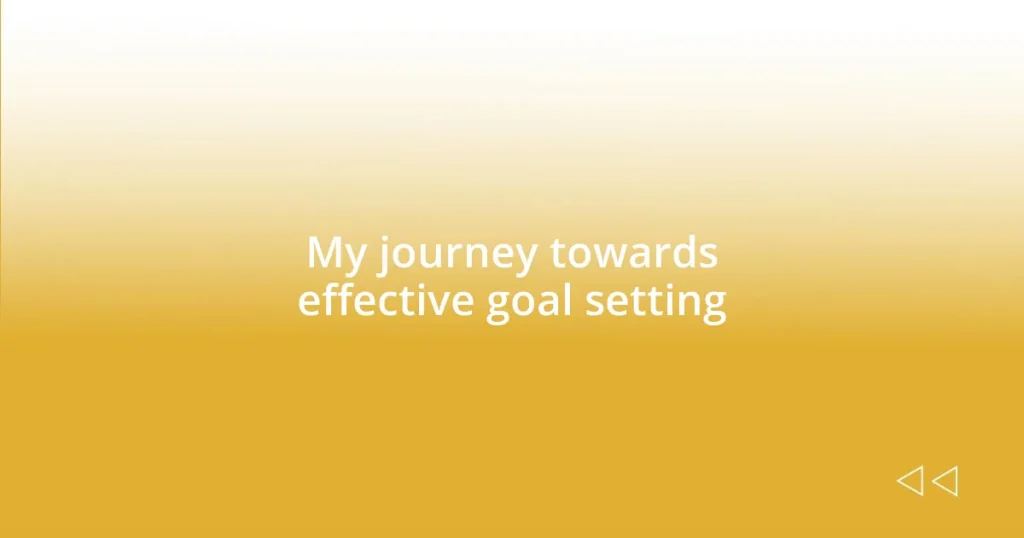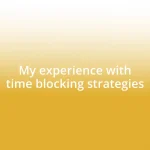Key takeaways:
- Goals should be SMART (specific, measurable, attainable, relevant, time-bound) for effective execution.
- Tracking progress with structured methods, like digital apps and bi-weekly checkpoints, enhances motivation and allows for timely adjustments.
- Setbacks can be valuable learning experiences; acknowledging feelings and seeking support are crucial for overcoming them.
- Celebrating milestones and small victories reinforces motivation and transforms the journey into an enjoyable experience.

Defining smart and achievable goals
Defining smart and achievable goals is about clarity and purpose. When I first started my journey, I remember setting goals that sounded good in theory but fell flat in execution. For instance, aiming to lose weight without a specific plan is like saying you want to travel without a destination—it’s easy to get lost along the way.
As I refined my goal-setting process, I realized how important it is for goals to be specific, measurable, attainable, relevant, and time-bound—or SMART, for short. I once set a goal to read more books, but without specifics, I often found myself distracted by other commitments. So, I shifted to a goal of reading one book per month by scheduling time on my calendar. That simple change made all the difference.
What do you want to achieve, and how can you break it down into manageable steps? I discovered that writing my goals down and checking them off created a sense of accomplishment that fueled my motivation. It’s not just about setting goals; it’s about creating a plan that feels achievable, making the journey not just productive but enjoyable.

Tracking progress effectively over time
Tracking progress is a vital aspect of achieving any goal. I remember the first time I attempted to monitor my progress; I just jotted down achievements on a sticky note. It seemed straightforward, but it quickly became cluttered and ineffective. That’s when I learned the value of structured tracking tools. I transitioned to using a digital app that allowed me to visualize my progress over time, which made tracking not only clearer but also more motivating. Seeing my growth represented graphically truly inspired me to maintain momentum.
Regularly reviewing my progress led to surprising insights. For example, I realized halfway through a goal of increasing my fitness level that my routines weren’t delivering the results I expected. At first, it was frustrating, but tracking helped me identify patterns and adjust my workouts. This experience taught me that tracking isn’t just about noting progress; it’s also about understanding your journey, adapting when necessary, and celebrating small victories along the way.
One major breakthrough was when I started setting checkpoints—bi-weekly evaluations of my objectives. Instead of waiting until the end goal was reached to assess my progress, I could see where I stood every few weeks, letting me adjust my approach if needed. It was enlightening to see how a simple checkpoint could reduce anxiety, making the long journey toward my goals feel less daunting.
| Tracking Method | Pros |
|---|---|
| Sticky Notes | Simplistic; visible reminders of progress |
| Digital Apps | Organized, visual representation of progress, with insights |
| Bi-weekly Checkpoints | Frequent assessments; allows for real-time adjustments |

Overcoming challenges and setbacks
I’ve faced my fair share of challenges while pursuing my goals. For example, there was a time when I became exceptionally frustrated after falling short of my physical fitness targets. It felt like a total setback, and I almost considered giving up. But I learned that setbacks are often valuable teachers. They provide an opportunity to reassess my methods and adapt my strategies. Instead of sulking, I pulled out my notebook and started reflecting on what went wrong, focusing on the adjustments I could make. As I embraced this process, I discovered that my setbacks often led to the most profound lessons, ultimately making me more resilient.
Here are some practical strategies I found helpful in overcoming challenges:
- Acknowledge Your Feelings: It’s essential to allow yourself to feel disappointed without judgment. Recognizing these feelings helps process them.
- Analyze the Setback: I found it helpful to pinpoint specific reasons for my challenges. By doing this, I could devise targeted solutions rather than feeling overwhelmed.
- Seek Support: Sharing my experiences with friends or mentors provided new perspectives and encouragement.
- Adjust Goals as Needed: I learned that flexibility is crucial. Sometimes I had to revise my initial goals to make them more attainable based on my circumstances.
- Celebrate Small Wins: When I started acknowledging the small victories—like just showing up to my workout—my motivation reignited, making the larger journey feel more manageable.
Embracing these strategies transformed my perspective. Each challenge became not just a problem, but a stepping stone toward achieving my goals.

Celebrating milestones and achievements
Celebrating milestones is essential in making the goal-setting journey enjoyable. I vividly remember the thrill I felt when I completed a challenging project at work. Instead of just moving on to the next task, I decided to treat myself to a night out with friends. That celebration wasn’t just about marking a point in my journey—it reinforced my motivation, reminding me that hard work deserves recognition.
Each time I hit a milestone, I found it beneficial to reflect on what I had learned along the way. For instance, when I reached a significant fitness goal, I didn’t just think about the number on the scale; I considered how far I had come in terms of discipline and self-care. This reflection transformed my perspective—celebrating isn’t merely about achieving; it’s also about appreciating the growth, effort, and commitment I put in. Have you ever paused to acknowledge how your efforts have changed you, not just in terms of accomplishments but in gaining resilience and wisdom?
When it comes to celebrating achievements, the little things matter too. If I managed to stick to my daily writing habit, I might treat myself to a new book or enjoy a quiet evening with a favorite movie. It’s those small rewards that keep the fire alive, turning the pursuit of goals into a journey filled with joy and anticipation. Engaging in such celebrations helps me stay connected to my passions, making the process as gratifying as the end result.















